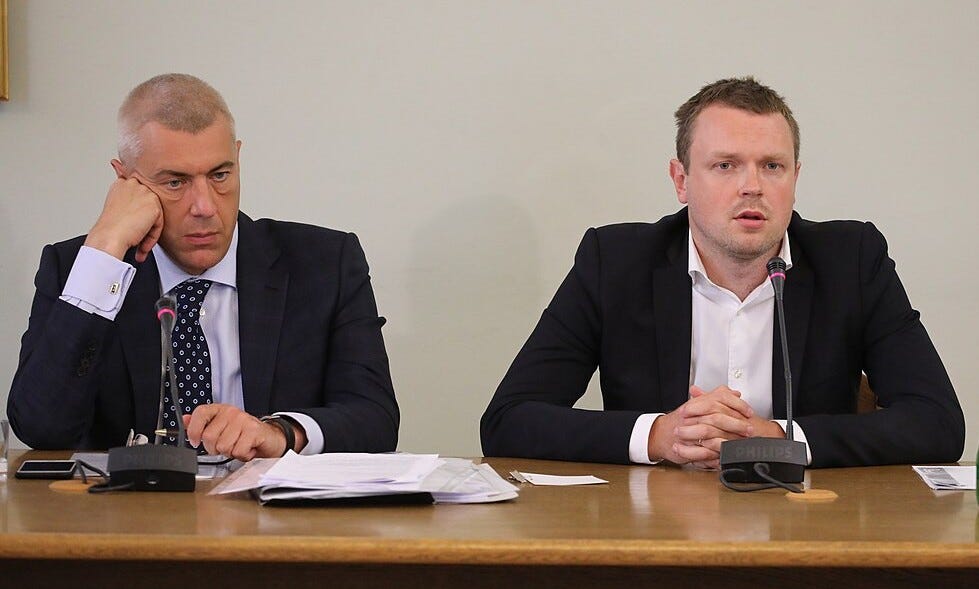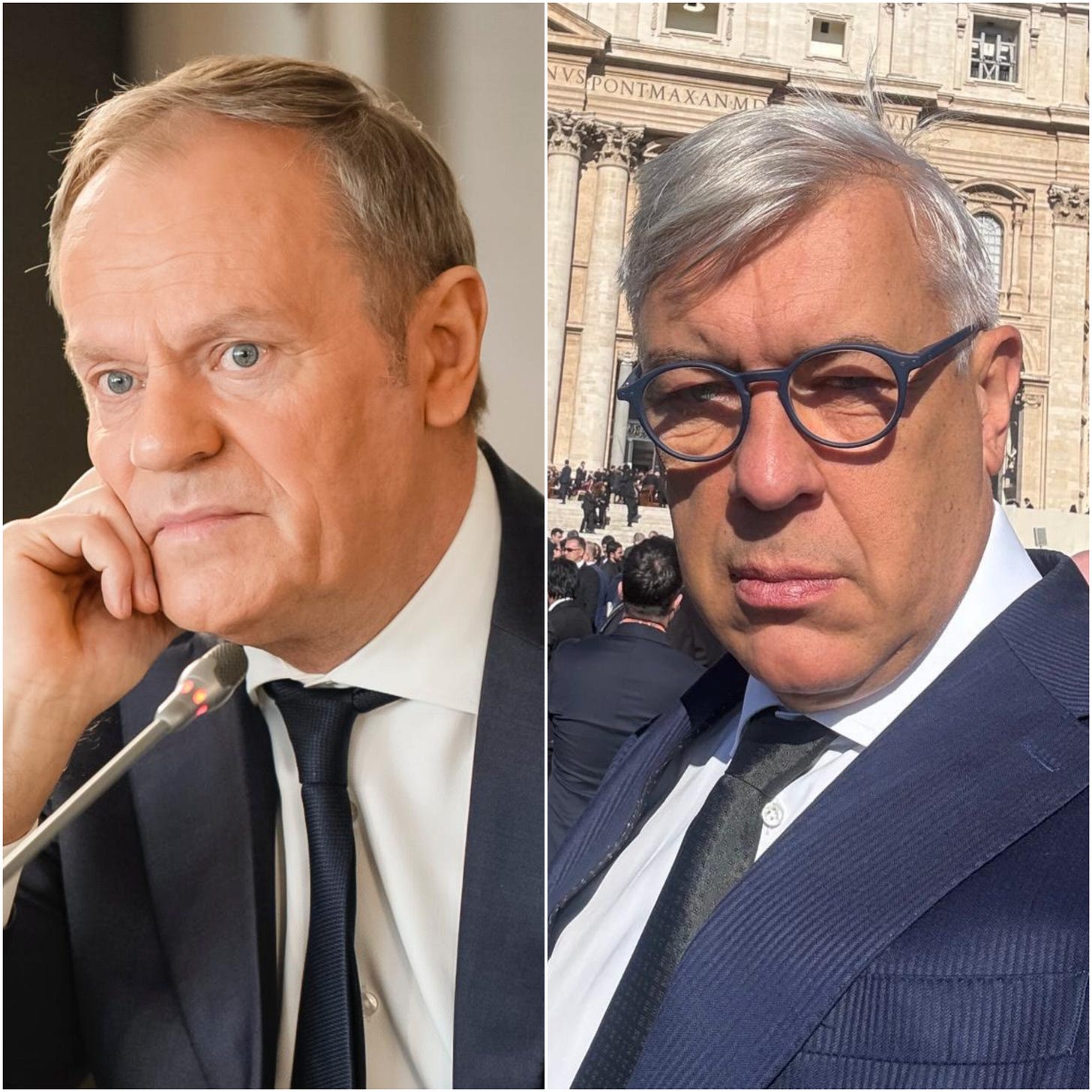Poland’s Deep State Strikes Back: The War on Democracy and Free Press
Tusk’s regime is using classified charges to target TV Republika after it revealed explosive election leaks. This is a war on journalism — and democracy itself.
In yesterday's Rock Rachon We Rollin' post, we began with the alarming news that Prime Minister Donald Tusk’s government — having lost the presidential election — is now actively attempting to invalidate its outcome. Even more dangerously, it is working to delegitimize the authority of the Supreme Court, which is constitutionally tasked with confirming Karol Nawrocki as the new President of the Republic of Poland.
In a grotesque twist of legal manipulation, Prime Minister Tusk has deployed his personal legal adviser, Roman Giertych — who is not only his attorney but also a sitting Member of Parliament — to challenge the integrity of an electoral process that was conducted under full state control and oversight. It is an absurdity. A cynical abuse of institutions. And it’s a political scenario we’ve warned about for weeks — one where a ruling elite, unwilling to accept democratic defeat, begins dismantling the very constitutional framework that protects the republic.
On Wednesday the 18th, that scenario escalated further. Justice Minister and Prosecutor General Adam Bodnar made an outrageous declaration: he stated that the Chamber of Extraordinary Control and Public Affairs of the Supreme Court — the judicial body explicitly designated by the Polish Constitution to validate elections — “is not a court.” He further announced that any rulings issued by this body would not be recognized by the government. This is not simply an expression of legal disagreement; it is a fundamental rejection of constitutional order. For the first time since 1989, we are witnessing a government in Poland openly refuse to accept the result of a counted and certified democratic election.
But the situation continues to spiral. Just three days ago, Adam Bodnar revealed that his office had launched a classified criminal investigation into TV Republika — Poland’s largest conservative news outlet, and the only major media organization willing to challenge the government's narrative in real time.
Why this attack on the press? The answer is as brazen as it is revealing.

TV Republika had the audacity to report the truth — specifically, to publish a bombshell series of audio recordings featuring none other than Donald Tusk and his longtime political fixer Roman Giertych. These recordings revealed the two men engaged in strategic election planning ahead of the 2019 Polish parliamentary vote — conversations that took place while Tusk was still serving as President of the European Council. That position, governed by the European Union’s strict neutrality rules, explicitly prohibits any such partisan involvement. The tapes confirmed what many suspected: that Tusk used his Brussels perch to coordinate domestic political operations behind closed doors.
The release of these materials triggered a political earthquake, exposing the dirty machinery behind Tusk’s operations. But what followed may prove even more significant than the revelations themselves.
Within just 24 hours of the recordings being made public, Prosecutor General Bodnar announced that two criminal complaints had been filed against TV Republika with the National Prosecutor’s Office:
The first came from Roman Giertych himself — now not only a subject of the recordings, but also the chair of a parliamentary committee investigating alleged abuses by the former government.
The second was submitted by Poland’s Central Anti-Corruption Bureau (CBA), a powerful state agency tasked with protecting national integrity.
The truly disturbing element? The CBA’s complaint was filed with a “top secret” classification — effectively placing the entire investigation beyond the reach of the public, the press, and even the individuals targeted by the probe. According to Bodnar’s statement, this classification prohibits any disclosure of the nature, scope, or reasoning behind the investigation. No one — not even the journalists potentially implicated — can know what they are being accused of, or why.
But even this is not the end of the deeply troubling implications behind Tusk and Bodnar’s maneuver. The initiation of a secret investigation likely means that journalists from TV Republika may already be under operational surveillance by the Polish intelligence services. Wiretaps, tracking, the scrutiny of every detail of their personal and professional lives — this is the reality now threatening the reporters of the only media outlet in Poland capable of challenging Tusk’s stranglehold on information. This is nothing short of a totalitarian threat, straight out of the darkest days of communist rule…
This is a direct attack on press freedom. While the official communiqués have not named specific individuals, the implications are chilling. Editors, reporters, and anyone who contributed to the publication of the materials could now be swept into a secret criminal process — stripped of legal transparency, without public scrutiny, and with no ability to defend themselves in the open.

What we are witnessing is a deliberate weaponization of secrecy laws to suppress dissent and punish investigative journalism. When a government cannot refute the facts, it resorts to criminalizing their exposure. When it cannot challenge the evidence, it hides the proceedings behind closed doors.
At the heart of this affair stands Roman Giertych — the same man caught on tape discussing backroom electoral maneuvers, now leading a legal campaign to overturn the presidential election, and simultaneously spearheading efforts to criminally target the media outlet that dared to report on him. The contradiction speaks volumes. The timing is not a coincidence — it’s a tactic.
Make no mistake: this is not simply a media story. It is a full-blown test of democratic norms in Poland. At stake is a principle more fundamental than any election or party: the right of the press to hold power to account. The right to publish uncomfortable truths. The right to speak freely — even when it disrupts the plans of those in power.
While the world’s eyes are fixed on wars abroad and summits of global elites, a different kind of battle is being fought here in Poland — a battle for the soul of democracy itself. Do not look away.
Silencing journalists through classified prosecutions is not justice. It is a warning. And the world would be wise to pay attention.





